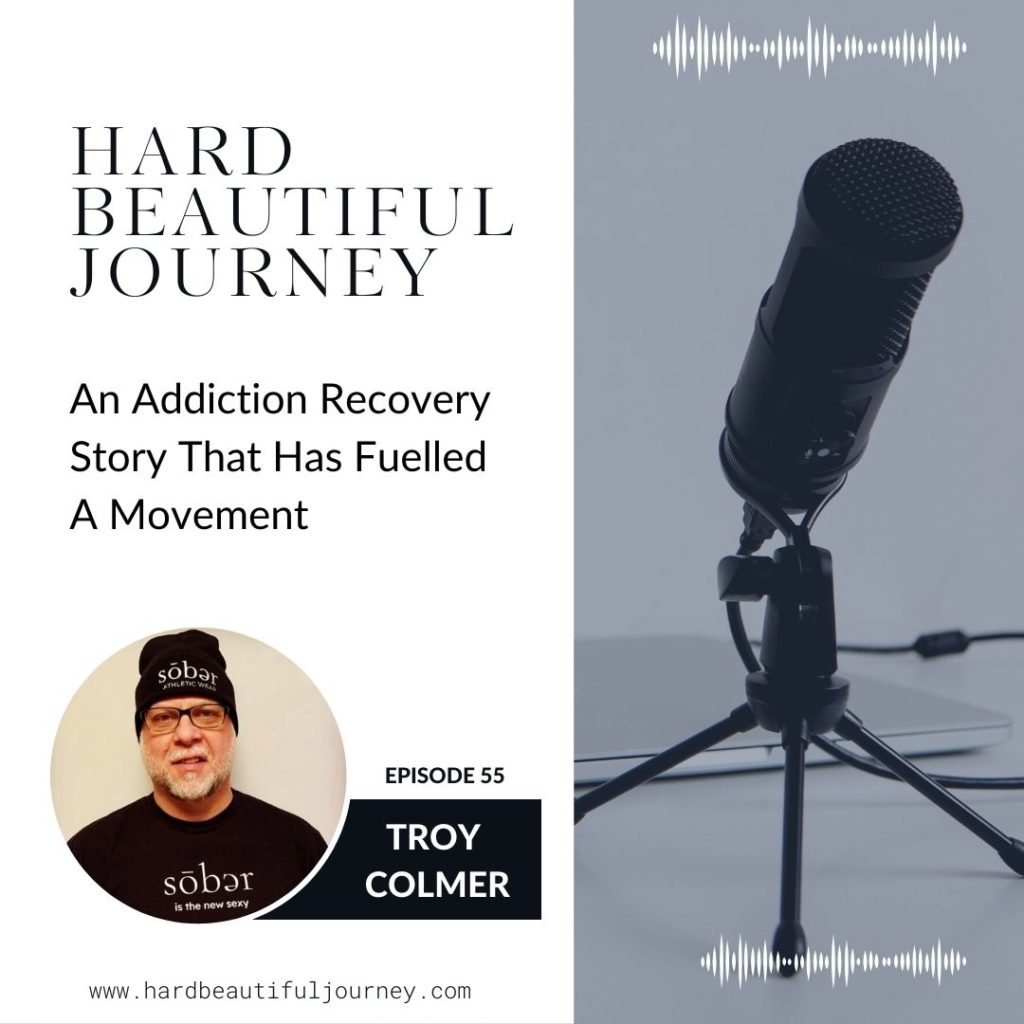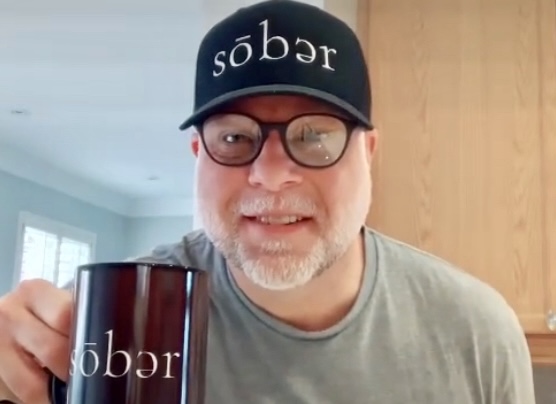Troy Colmer, the founder of Sober Athletic Wear, joins us to share his story of addiction and recovery.
Sober Athletic Wear is a social enterprise with a goal to empower people to live their best life and show pride in their recovery by wearing the Sober brand. People who know family and friends dealing with mental health and addictions are also encouraged to sport the Sober brand. Through this act of love and kindness, together, we can be one step closer to de-stigmatizing the word sober.
Here are three reasons why you should listen to the complete Episode:
- Troy gets vulnerable and shares his journey of addiction and recovery.
- He sheds light on the importance of choosing recovery for yourself, not for others.
- Learn more about how Troy is helping others struggling with addiction and mental health issues.
Episode Highlights
Who is Troy Colmer
- Troy started drinking at the young age of 14.
- He went on to use alcohol as a coping mechanism throughout his life.
- After his second attempt at recovery, Troy is now four months sober.
- Through awareness and sharing his story, he hopes to de-stigmatize addiction, mental health, and the word, sober.
His upbringing
- Troy came from a good home and said he had loving parents.
- It was a conservative right-wing religious home.
- Troy felt that he couldn’t live up to what his parents and community wanted him to be.
- He was a people pleaser, wanting his parents to love him.
Where it all started
- Troy started experimenting with alcohol, not out of a need for it, but curiosity.
- What it did for him, he was not expecting.
- It brought relief to his brain that Troy had never felt before.
- As he grew up, he incorporated alcohol more and more.
The void in his life
- Troy got married, had a family, a home, and a good career.
- He appeared to be a regular guy from the outside, but he felt a void in his life that he was filling with alcohol.
- Sharing his emotions was not something that he was taught when growing up; no one talked about mental health.
The first attempt at recovery
- Troy was drinking every day to fill the lack of joy he felt in his life.
- His wife noticed the excessive drinking and approached him to start recovery.
- He was stubborn and didn’t fully commit to the program and the recovery process.
- While Troy reduced his drinking for a little while, it wasn’t sustainable.
Lying and sneaking around
- Troy was lying and sneaking around, trying to hide his drinking from everyone.
- His wife needed him, but he was too intoxicated to assist her.
- She would get extremely frustrated.
Excuses, excuses, excuses
- Troy always had excuses for drinking.
- Whether it was a sport, to destress after work, to celebrate an occasion, or just sometimes because it was a sunny day.
- He always justified his excessive consumption of alcohol.

The tipping point
- After a game of golf, Troy went to get alcohol.
- He came home very drunk, and his wife said she couldn’t carry on like this anymore.
- He contacted a friend whose dad had recovered from alcohol abuse, he made some recommendations and started his journey to recovery.
It was different this time
- Troy went to a treatment center and has been sober for four months.
- His recovery journey was different this time, and he chose to do it for himself and not for others.
- He says that this was a key and a huge turning point in his journey.
Influential people in his recovery
- His minister was never judgemental.
- His friends never put him in a position that would compromise his recovery.
- His wife had many reasons to leave but chose to stay and support him.
- The many counselors played a part in his recovery and growth journey.
Helpful resources that assisted his recovery
- One-on-one counseling for accountability.
- Mindfulness groups where he’s learned to meditate – this has been transformative and forms part of his morning ritual.
- The process of journaling for five minutes every day and showing gratitude each morning.
One day at a time
- Learning to take recovery one day at a time was essential for Troy.
- Not only is this relevant to drinking, but mental health in general.
- Living in the moment, from a second, minute, hour, to a day.
The treatment that’s right for you
- There are many forms of treatment in a recovery journey, and each person needs to choose what is right for them.
- The 12 step program is not for everyone, and it’s important to explore all options.
- Troy had to try a few things before discovering what felt suitable for him.
- Finding what’s right for you is vital in one’s recovery.
The mental health space
- Steps have been made to start the de-stigmatization of mental health, but there is still a long way to go.
- While conversations are good for awareness, more action is needed in the mental health space.
- There has been a lot more grace towards people who share their mental health stories.
- It boils down to us being a kinder society.
There’s power in shared experiences
- Troy says it takes a lot of courage for people like him to share their stories.
- If it can resonate or help someone, then that’s what’s important to him.
- He used to be embarrassed and ashamed, but now sharing his story is like therapy.
- Being honest and authentic has been the most freeing way for him to get sober.
Sober Athletic Wear
- Sober Athletic Wear is a social enterprise that empowers people to live their best lives and show pride in their recovery by wearing the Sober brand.
- His goal is to get one step closer to de-stigmatizing the word sober.
- He wants to raise funds and awareness to help more people.
What Troy is grateful for
- He is grateful for the platform and ability to share his message.
3 Powerful Quotes from this Episode
12:54 – “So, as I got older, I had a very, very deep depression in 2010. I wasn’t happy as a husband, I wasn’t happy as a dad, I wasn’t happy with my job. I wasn’t happy with anything, and I just didn’t know what it was. I just lacked joy in life. And I filled that joy, I guess or cope with that lack of joy through alcohol”.
17:15 – “It’s been easier this time because I’ve finally, finally, did it for me. That was the key. It didn’t matter if my wife cried, begged me to stop drinking. It didn’t matter if I was negatively influencing my kids by seeing me in a certain state or arguing in the home and a lot of tension. None of it mattered”.
24:30 – “So it’s learning to, as they say, in recovery one day at a time, and it applies to more than just drinking. It’s I think people just with mental health in general, can benefit from living one day at a time and living in the moment and I do I live, you know, second minute hour to date, and you know, those types of things like that, like, I can make a wrong decision at any time. So I need to be mindful of that. That’s really helped me quite a bit”.
Connect with Troy Colmer
Enjoying the Hard Beautiful Journey podcast?
Click here to follow on Apple Podcasts. While there, please leave a 5-star rating and review, it would mean so much to me! Also, if you haven’t done so already, join the Hard Beautiful Journey community to connect with other like-minded people.
I would love to connect with you on socials so please give me a follow on:
Thanks for listening,
Tiff
Leave a Reply Cancel reply
This site uses Akismet to reduce spam. Learn how your comment data is processed.

add a comment
+ show comments